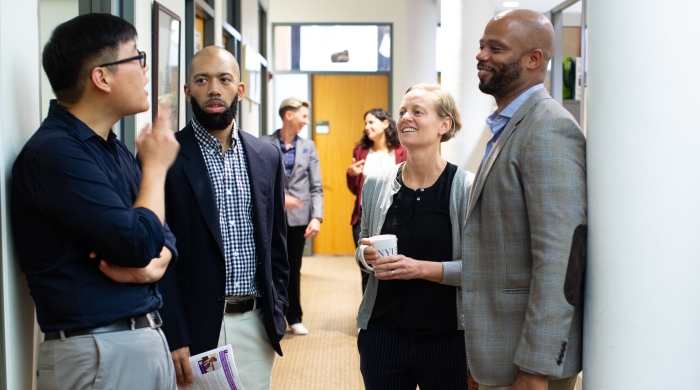Taught by faculty from across the School, Interdepartmental Research Studies (IDRS) offers a wide array of courses to train students in several different modes of research methodology. Undergraduate, masters and doctoral courses are offered in both general and specialized research areas. IDRS does not offer stand alone degree programs.
Because the combinations of research courses required by various programs differ, students are urged to register for these research courses only after consultations with their advisers and, if needed, in consultation with the IDRS co-directors Marc Scott (quantitative) and Lisa Stulberg (qualitative). A set of suggested classes is given next.
NOTE: Applied Statistics courses are now listed primarily as part of the Applied Statistics for Social Science Research (A3SR) masters program and use a new prefix, APSTA. When they have broader appeal and purpose, we list them below.
Required Courses for Undergraduate Students
- APSTA-UE 0020
- APSTA-UE 1085
Required Courses for Master's Students
- APSTA-GE 2085
- APSTA-GE 2086
Many of the doctoral course offerings are open to advanced master's students. In particular, master's students who intend to take additional statistics classes must begin with APSTA-GE 2001 and APSTA-GE 2002, rather than APSTA-GE 2085 and APSTA-GE 2086. Consultation with your adviser and instructor is highly recommended
Required Courses for Doctoral Candidates
- Statistics for the Social and Behavioral Sciences I and II (APSTA-GE 2001 and APSTA-GE 2002)
- Intermediate and Advanced Quantitative Methods (APSTA-GE 2003 and APSTA-GE 2004)
For quantitative work, it is recommended that the first year of statistics be taken in the first year of the course of study. APSTA-GE 2003 and APSTA-GE 2004 are gateway courses that serve as prerequisites for advanced topics such as Causal Inference (APSTA-GE 2012) and Multilevel Models (APSTA-GE 2040 or 41-APSTA-GE 2042).
Biostatistics I and II (APSTA-GE 2995 and APSTA-GE 2996) form an alternate first year statistics sequence. They are recommended for master's students specializing in the health professions and for some doctoral students in nursing and health related disciplines.
For graduate students interested in doing qualitative research projects, especially doctoral students who plan to write dissertations involving qualitative interviews or fieldwork, we offer a number of qualitative methods courses. The first class in the series for many students is RESCH-GE 2140 Approaches to Qualitative Inquiry. This is a prerequisite for a number of advanced courses in the qualitative methods series, like RESCH-GE 2141 Case Study and Ethnographic Inquiry, RESCH-GE 2141 Interviewing and Observation, and RESCH-GE 2147 Fieldwork: Data Collection. Other qualitative specialization courses -- which do not require RESCH-GE 2140 as a prerequisite -- include Historical Research (RESCH-GE 2135) and Participatory Action Research (RESCH-GE 2143).
Doctoral students often take Writing Empirical Research (RESCH-GE 2138) and Dissertation Proposal Seminar (TCHL-GE 3001) as well.
Students should take several 3-point design courses: Empirical Methods (RESCH-GE 2132) or its equivalent, followed by Survey Research (APSTA-GE 2139) and/or Large Databases (APSTA-GE 2110).
Applied Statistics and Computational Social Science
Implement and develop advanced computational and statistical methods to address critical policy issues across social, behavioral, and health sciences.
Sociology of Education
In this program you will learn to analyze educational problems and issues, such as educational equity, using a sociological lens.
Education and Social Policy
Rooted in economics and sociology, this program has a strong emphasis on using quantitative methods to ascertain causal effects of programs and policies.






